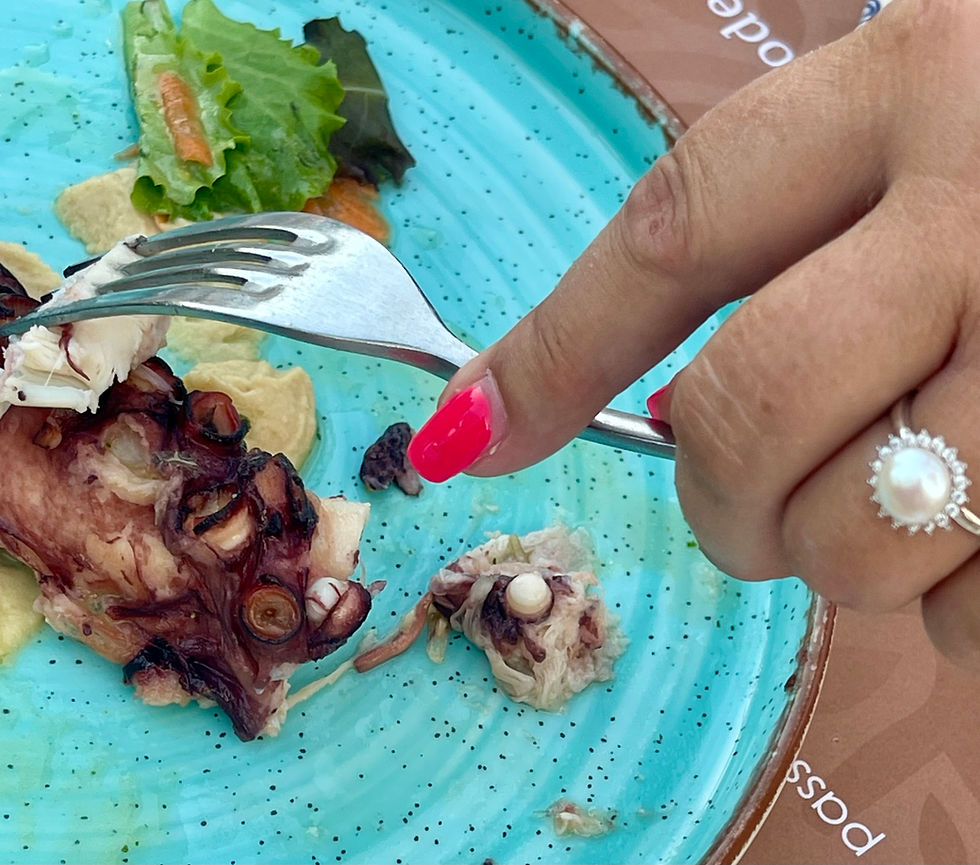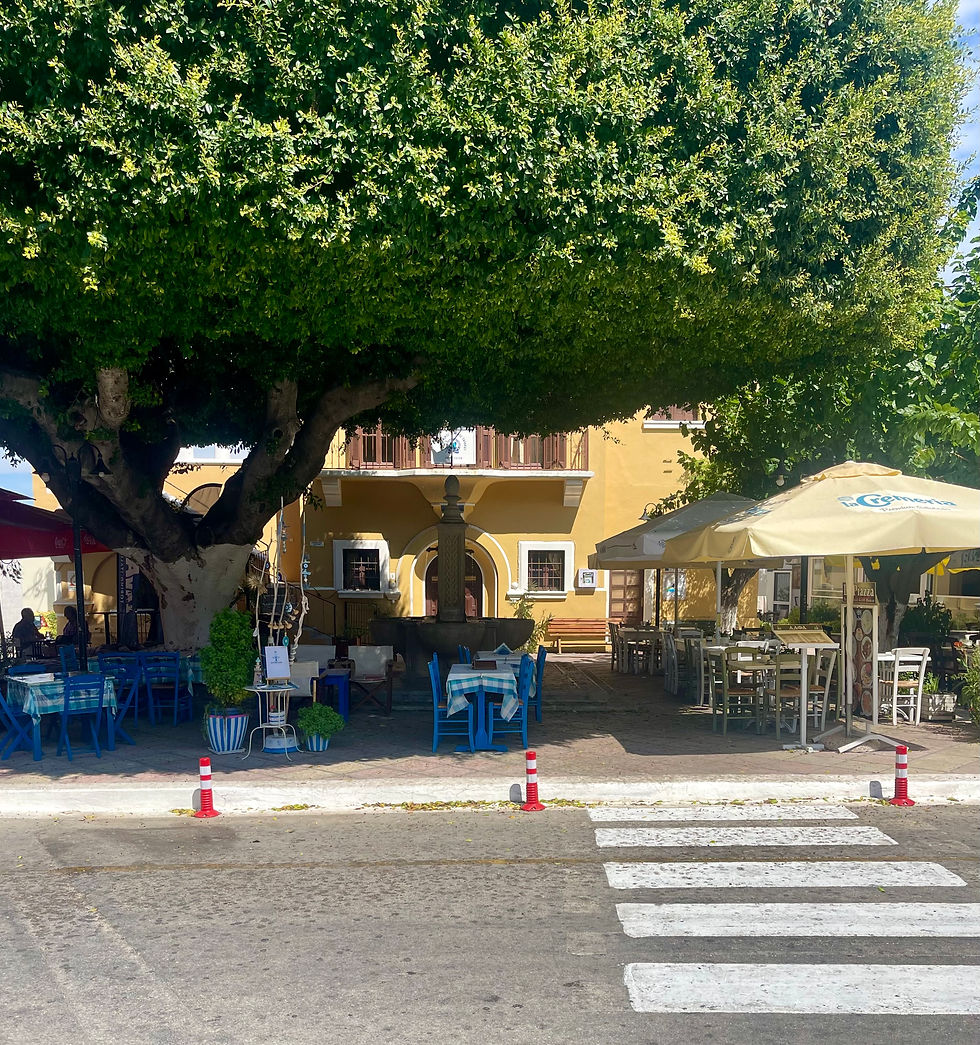The Power of Filotimo and Filoxenia: Small Business Lessons from Rhodes
- Ioannis John Anagnostou

- Sep 27, 2024
- 6 min read

Lately, my wife and I have been spending four weeks of our vacation time on my birthplace, the island of Rhodes, and there are several reasons why we keep returning.
We love Rhodes for being one of the most historically rich and diverse destinations in Greece.

One of the island’s standout features is its living medieval town, the best-preserved in Europe and a UNESCO World Heritage site, which transports visitors back to the time of the Knights of St. John.
Rhodes is also home to several ancient ruins, such as the Acropolis of Lindos, which offers stunning views over the Aegean Sea, and the Temple of Apollo.
In addition to its rich history, Rhodes boasts some of the most beautiful beaches in Greece, including Tsambika, Prasonisi, Kalithea, Faliraki, Anthony Quinn Bay, and more. Known as the “Island of the Sun,” Rhodes enjoys over 300 days of sunshine each year, making it an ideal year-round destination.
The island offers a wide range of experiences: cultural immersion, historical sightseeing, water sports, hiking, and vibrant nightlife. But what truly stands out about Rhodes is the character of its people.
"Give with an open heart, expecting nothing in return.”
Like many Greeks, as is common throughout southern Europe, the locals of Rhodes practice filoxenia (φιλοξενία), the ancient Greek tradition of welcoming guests with warmth and generosity. It’s a combination of the words “φίλος” (filos), meaning "friend," and “ξενία” (xenia), meaning "stranger." Visitors often remark on how friendly and accommodating the people are, making tourists feel like part of the community.
They also embody filotimo (φιλοτύμο), which can be understood as an eagerness to act with respect, appreciation, and honour, without any expectation of reciprocity. It combines the words “φίλος” (filos), meaning "friend," and “τιμή” (timi), meaning "honour" or "respect."
As my wife puts it, it’s something all humans should naturally do for one another: “Give—whether it’s aid, service, or whatever is needed—with an open heart, expecting nothing in return.”
While contemplating these ideas with my wife, it dawned on me how the concepts of filotimo (φιλοτύμο) and filoxenia (φιλοξενία) relate to small business and entrepreneurship, particularly in how they drive the pursuit of honour and excellence in one’s work.
Here’s how it connects.
Firstly, a small business owner and staff with a filotimo and filoxenia mindset would strive to run their business with a deep desire to deliver high-quality products or services in a warm and hospitable manner. They would be motivated to build a reputation for excellence, fostering trust with customers.

Secondly, small businesses often rely on word-of-mouth and customer relationships. Operating with filotimo and filoxenia involves maintaining integrity, honesty, and ethical practices, which are key to building a strong reputation and attracting loyal clients.
Additionally, filotimo and filoxenia encompass a sense of ambition and pride in one’s accomplishments. Small business owners take pride in their entrepreneurial journeys, which drives them to constantly improve and aim for success.
Furthermore, small businesses play an important role in their communities. Acting with filotimo and filoxenia means not only focusing on personal success but also contributing positively to the local environment, creating value for customers, and supporting community growth. In essence, filotimo and filoxenia embody the ambition, pride, honour, ethical conduct, and warm hospitality that are foundational to a thriving small business.
Here are some additional small business examples that embody filotimo and filoxenia:

We love supporting small tavernas in villages where the owners take immense pride in using fresh, local ingredients and making every dish from scratch. Their filotimo drives them to maintain high standards, even if it means longer hours or more effort. Their motivation is not purely financial but comes from the honour and satisfaction of knowing their customers leave happy and well-fed. This leads to long-term success and sustainability. Profitability follows.
Each time we’re in Rhodes, we visit a craftsman who makes handmade leather goods. He devotes hours to perfecting each product, ensuring every stitch and detail reflects the quality of his work. His filotimo drives him to continuously improve, taking satisfaction in producing something valuable and well-regarded by his customers. This year, we ordered two personalized leather dog collars from him.

We also rented an apartment where our hosts warmly provided local welcome treats, tourist literature, and personalized advice on places to visit. They made us feel like part of the family, offering not just a place to stay but a genuine cultural experience that reflects the Greek tradition of filoxenia.
During a previous stay at a five-star hotel, the management upgraded us to upper-tier accommodations and provided additional services—such as free transport and an anniversary cake with Prosecco delivered to our room. They did this not only for a good review but because they genuinely believe in offering warmth and hospitality to strangers, which in turn leads to positive social media reviews.
On a personal level, during one of our early visits to Rhodes, an acquaintance from Canada who had made Rhodes his home would regularly pick us up and take us around the island, showing us everything it had to offer. He was honoured to be our guide and took great pride in making us happy. He did this out of filotimo—a deep sense of pride in himself, his island, and honouring his friends.
To show our gratitude, we covered his gas expenses, entry fees to museums and exhibits, and any meal expenses while sightseeing. It was the least we could do. This mutual expression of filotimo has fostered a lifelong friendship that continues to this day.
During our most recent vacation to Rhodes in August and September of this year, we had some difficulty finding our booked accommodation at 10 Kotroni Street in the small east-coast village of Kalithies. There was no number on the house, and the street name wasn’t visible.

I parked near the village square and headed to the busiest taverna/café. I asked the server if she knew the street, but she didn’t. She asked another person, but they weren’t familiar either.
However, a regular patron overheard our conversation and asked me for the name of the property owner. When I told him, he immediately stood up and offered to walk me there. “Come with me,” he said. We passed a variety store, two other tavernas, and several homes before he stopped and said, “Here it is.” Indeed, it looked just like the picture on the website.
That is filoxenia—an act of generosity and hospitality. In gratitude and personal pride (filotimo), we treated him and his friend to a round of drinks. It was the least we could do.
Additionally, our neighbour across the street would leave fresh figs, prickly pears, and cleaned pomegranates on our doorstep in the mornings, while another neighbour gifted us a handcrafted item for our newlyborn grandson.
These are just a few examples of the filotimo and filoxenia we experience every time we visit Rhodes. I recently realized how these values relate to small business and entrepreneurship, particularly in the pursuit of honouring customers and striving for excellence in one’s work, products, and services while welcoming guests with warmth and generosity.
As we reflect on our experiences in Rhodes, it becomes clear that the principles of filotimo and filoxenia are not just cultural traditions but also powerful business strategies that can be applied in any entrepreneurial context. Businesses that operate with the values of filotimo and filoxenia tend to build trust and loyalty, enhance the customer experience, encourage word-of-mouth marketing, foster a positive work environment, strengthen community relationships, and attract ethical, value-aligned customers. By operating with integrity, these businesses ultimately improve both their brand reputation and their bottom line. By embracing these values, small business owners can cultivate a unique and enriching environment that not only enhances customer satisfaction but also drives long-term success.
In today’s competitive marketplace, where consumers increasingly seek authenticity and meaningful connections, adopting a mindset rooted in generosity and respect can set a business apart. This approach creates a ripple effect—fostering a loyal customer base, enhancing employee morale, and ultimately benefiting the community as a whole.
As you navigate your entrepreneurial journey, consider how you can embody the spirit of filotimo and filoxenia in your business practices. In doing so, you may find that the rewards extend far beyond the balance sheet, enriching not only your business but your life as well. These timeless values can lead to sustainable growth and a lasting legacy.
About The Author

Ioannis John Anagnostou is the owner of businessMD.
businessMD is an expert small business solutions firm offering tailored business coaching and advisory, high-spec and bespoke business plans, and effective solutions to meet the current needs and future goals of micropreneurs and small business operators in Canada. By doing so, we increase the likelihood of achieving success and financial well-being for their business. Let’s Talk!









Comments